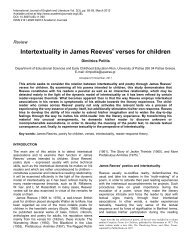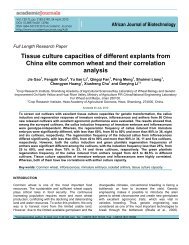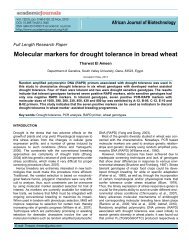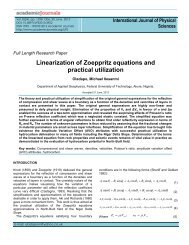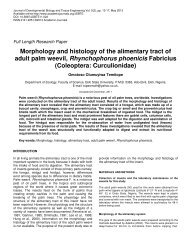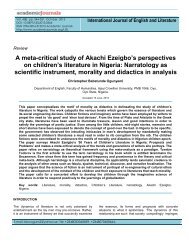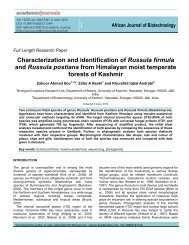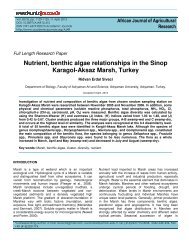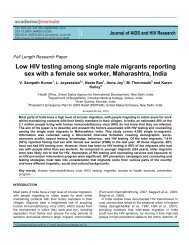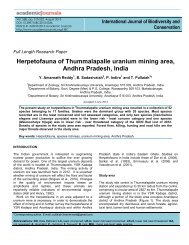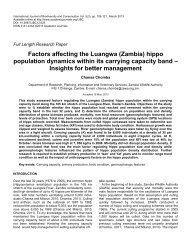workers - Academic Journals
workers - Academic Journals
workers - Academic Journals
Create successful ePaper yourself
Turn your PDF publications into a flip-book with our unique Google optimized e-Paper software.
Vol. 5(3) pp. 61-67, July, 2013<br />
DOI: 10.5897/JPAPR10.010<br />
ISSN 2141-2480 © 2013 <strong>Academic</strong> <strong>Journals</strong><br />
http://www.academicjournals.org/JPAPR<br />
Journal of Public Administration and Policy<br />
Research<br />
Review<br />
Workers – government wage relations and the<br />
unresolved issue of income inequality and labor strikes<br />
in Nigeria: Suggestion for the way forward<br />
Bashiru Salawu 1 *, Afees Hassan 2 and Ahmed Adefeso 3<br />
1 Department of Sociology, University of Ilorin, Nigeria.<br />
2 Department of Political Science and Industrial Relations, Fountain University, Osogbo, Nigeria.<br />
3 Department of Economics and Financial Studies, Fountain University Osogbo, Nigeria.<br />
Accepted 6 September, 2010<br />
Generally speaking, employees in all kinds of work organizations (private or public) exchange work for<br />
rewards, which take many forms (that is, material and non-material rewards). However, one of the most<br />
important of such rewards and invariably the most obvious is the money paid to <strong>workers</strong> either as<br />
salaries, wages or monitored fringe benefits. The importance of this group of reward lies in the fact that<br />
it constitutes the regime of benefit which impacts most greatly on the employees’ motivation to work<br />
and on their propensity to cooperate with the management thereby creating a stable industrial relations<br />
environment. Its management thus becomes an important issue in all manners of industrial relations<br />
system. In Nigeria, the administration of industrial compensation is always associated with a number of<br />
industrial relations related problems, the most important which are income inequality and industrial<br />
conflicts in form of labor strikes. This paper suggests some ways forward which include: the adoption of<br />
job-evaluation system in the fixing of salaries and wages; adoption of the principles of Human Resource<br />
Management (HRM) in the management of <strong>workers</strong>; and introduction of welfare schemes for <strong>workers</strong> to<br />
reduce income inequality.<br />
Key words: Material and non-material rewards, wages.<br />
INTRODUCTION<br />
Historically, there is a widespread interest in the role of<br />
money as a motivational tool for spurring people for<br />
higher productivity and for securing their allegiance to<br />
cooperate with the organizations in which they are<br />
members. This kind of interest was first stimulated by the<br />
ancient Greek philosophers like Hypocrites, Plato and<br />
Herodotus. In their pioneering works, they provided the<br />
foundation for discussion of money as a motivator in<br />
industrial compensation (Salawu, 1995). In summary,<br />
they believed that in acting, human beings usually seek<br />
for comfort and pleasure, while at the same time avoid<br />
discomfort and pain. This philosophical thinking is what is<br />
generally referred to today as the hedonistic conception<br />
of man, which eventually became the basic assumption in<br />
the prevailing economic and social philosophies of such<br />
famous men as Jeremy Benthem discussed in Bowring<br />
(1962); Mills J. S. discussed in Robson (1963); and Adam<br />
Smith (1835). In the classical economic theory<br />
championed by these men, they thought that the main<br />
goal of <strong>workers</strong> is the achievement of hedonistic<br />
satisfaction and maximization of his pecuniary income.<br />
Thus, monetary or financial compensation (wage or<br />
salary) is seen as a major influencer of work related<br />
behavior (Salawu, 1995). For example, Adam Smith,<br />
arguing in the context of the above, said that in acting,<br />
there is no sacrifice too much for <strong>workers</strong> in order to<br />
*Corresponding author. E-mail: drsalawu@yahoo.com. Tel: +2348033530779.
62 J. Public Adm. Policy Res.<br />
achieve higher wages. Similarly, Taylor (1923) in his<br />
scientific management theory emphasized the relationship<br />
between financial compensation and the extra effort<br />
put forth by the <strong>workers</strong> in the performance of their jobs.<br />
Specifically in this regard, Taylor (1923) emphatically<br />
remarked that <strong>workers</strong> will put forth extra efforts on the<br />
job in order to maximize their economic gains measured<br />
in terms of higher wages. The interpretation of this is that<br />
money is a great motivator of work behavior.<br />
From these pioneering works, a number of scholarly<br />
works now exist to establish a linkage between human<br />
needs (particularly, money) and work behavior. In the<br />
20th Century, for example, establishing an explanation of<br />
such linkages constituted an area of interest to many<br />
industrial researchers like March and Simon (1958);<br />
Wanons (1973); Porter and Steers (1973); Oloko (1973);<br />
Lock (1976); Nicholson (1984); Dalton et al. (1977);<br />
Oloko 1977; and Edwards (1979).<br />
In order to illustrate the linkage between monetary<br />
rewards and work behavior as contained in the above<br />
cited works, the work of Lindahl (1949) provides a good<br />
starting point for a discussion on this issue. In his<br />
empirical study, Lindahl attempted to find out what<br />
<strong>workers</strong> actually seek from their jobs. This, he did<br />
because he believed that what <strong>workers</strong> seek for would in<br />
turn motivate their behavior in the work organizations in<br />
which they operate. Lindahl’s work revealed that while<br />
supervisors thought that <strong>workers</strong> ranked good wages, job<br />
security, promotions and good working conditions as<br />
things that motivate them, they themselves ranked full<br />
appreciation for work done and sympathetic understanding<br />
of personal problems as the things they actually<br />
want form their jobs.<br />
The work of Porters and Lawler (1965) is another<br />
attempt to test the validity of some of the scholarly works<br />
(that is, theories of motivation of the 20th century). In<br />
particular, their work attempted to test the validity of the<br />
five-reinforcement needs assumption in Maslow’s Theory.<br />
They concluded that there are two types of reward<br />
namely: intrinsic and extrinsic rewards (Salawu, 1995). In<br />
this empirical work, Porter and Lawler claimed that<br />
intrinsic rewards include feelings of accomplishment and<br />
satisfaction of higher needs, while extrinsic rewards are<br />
increased pay, promotion, job securities etc. A very<br />
useful study following the works of Lindahl and Porter<br />
and Lawler is a survey conducted by the U.S. Department<br />
of Agriculture and the War information survey office<br />
on employees of some war industries. Results of the<br />
study show that respondents ranked wages, followed by<br />
effective and impartial promotion as their most highly<br />
valued motivating items.<br />
The muddy water study conducted by Oloko (1973) is<br />
yet another study specifically designed to test the Maslow<br />
hierarchy of need theory among some Nigerian <strong>workers</strong>.<br />
In this study, Oloko carried out an extensive socio-psychological<br />
survey of factors, which influence the extent to<br />
which employees discharge their role obligations in ways<br />
that would enhance the effectiveness of the company.<br />
The results of this study show that the organizational<br />
components such as promotion, job security and salary<br />
are the dominant reinforcers for Nigerian <strong>workers</strong>. The<br />
work of Di-Dominico (1973) on the recruits of the Nigerian<br />
tobacco company at Ibadan is another study that shows<br />
that the Nigerian <strong>workers</strong> had an instrumental attitude to<br />
work. What this means is that they emphasized money<br />
and wages as the primarily movers of their behavior to<br />
join and remain with the organization.<br />
From the various works reviewed above, one can<br />
conclude that in their own way, these 20th century<br />
scholars were able to show among other things that pay<br />
or wage constitutes an important aspect of industrial<br />
relations which either helps to maintain or destroys it<br />
depending on the way and manner it is managed. In this<br />
paper, we intend to examine the history of <strong>workers</strong>government<br />
wage relations in Nigeria and the resulting<br />
income inequality and incessant labor strikes that usually<br />
heat up the Nigerian industrial relations environment. The<br />
paper then suggests some of the ways by which the<br />
unresolved issue of income inequality and labor strike<br />
can be resolved and therefore serving as coolant for the<br />
industrial relations system in Nigeria. To achieve this, the<br />
remaining part of this paper is divided up into the<br />
following sections: the history of wage problem and its<br />
administration in Nigeria a review; evidences of income<br />
inequality in Nigeria; suggestions for the way forward;<br />
and conclusion.<br />
The history of wage problem and its administration in<br />
Nigeria: A review<br />
Wage agitation between <strong>workers</strong> and government and its<br />
final determination have a long history in Nigeria.<br />
However, to properly understand the history of wage<br />
agitation in Nigeria, the cost-of living award (COLA)<br />
agitation of 1941 provides us with a good stating point for<br />
the discussion of this issue. Even though, there might be<br />
other <strong>workers</strong>’ protests before on the welfare of the<br />
<strong>workers</strong> as it was the case with the 1941 COLA agitation,<br />
indeed, the COLA agitation has been seen in many<br />
quarters as an offshoot of the economic difficulties<br />
created by the British government involvement in the<br />
prosecution of the Second World War. This economic<br />
difficulty as it turned out to be affected the working class<br />
more than any other sectors of the urban centers. Thus,<br />
because of the economic hardship caused by war<br />
prosecution and suffered by the working class, the<br />
railway unions demanded a cost-of-living award in 1941.<br />
The <strong>workers</strong>’ demand was turned down and a crisis<br />
resulted. In order to deal decisively with the situation, the<br />
government set up a committee to look into the circumstances<br />
surrounding the <strong>workers</strong>’ agitation. Following<br />
from the committee’s report, the government granted a<br />
cost – of - living allowance (COLA) to all its <strong>workers</strong>.
Salawu et al. 63<br />
Thereafter the COLA award, a number of other trade<br />
unions emerged in the Nigeria industrial relations system<br />
to agitate for and get the COLA allowance.<br />
The general strike of 1945 is another wage agitation<br />
that brought the government face to face with the<br />
Nigerian <strong>workers</strong> and which again resulted in wage<br />
movement for the Nigerian <strong>workers</strong>. Discussing the<br />
circumstances that led to the strike, Ubeku (1983)<br />
mentioned the economic conditions of the post war<br />
period, which became harsher. In order to ameliorate<br />
these harsher economic conditions, the unions simply<br />
capitalized on the success, which they recorded in an<br />
earlier agitation (the-COLA agitation) to demand for a<br />
cost-of-living increase over the awards made by the<br />
government in 1942. As usual of the government, the<br />
<strong>workers</strong>’ demand was refused and a general strike was<br />
called by the <strong>workers</strong>. Like the 1941 COLA agitation, the<br />
railway unions engineered the general strike of 1945. The<br />
strike was also adjudged to be successful. In his<br />
appraisal of the success of the strike Ubeku (1983)<br />
observed that the strike, which lasted forth-five days, was<br />
successful in its economic aims to the extent that all<br />
economics activities were paralyzed and the government<br />
was forced to appoint the Tudor Davies commission. On<br />
the basis of the commission’s report, the government<br />
awarded substantial increases based on the cost-ofliving.<br />
One important thing about the 1945 <strong>workers</strong> strike,<br />
which is worthy of mentioning here is that it has a farreaching<br />
implication on the wage increase procedure in<br />
Nigeria. At least, the near-unilateral determination of<br />
wages and salaries by employers which characterized<br />
the era before the general strike of 1945 seemed finally<br />
to have been ended. That is, the existing unions could<br />
now regroup to form countrywide trade unions that would<br />
present well-reasoned memoranda to any commission<br />
set up by the government. This situation continued till the<br />
country gained her independence in 1960.<br />
After the independence, the trade unions in Nigeria<br />
have continued to be at the center of wage agitation. For<br />
example, the Trade Union Congress of Nigeria (TUCN)<br />
and the Nigeria Trade Union Congress (NTUC) had in<br />
1961, presented memoranda to the Federal Government<br />
pressing for two main issues. These are; (1) a review of<br />
wages and salaries and (2) regrouping of all the house<br />
unions into twenty-five industrial and general unions. On<br />
the issue of wage review, the ULC and NTUC specifically<br />
demanded for the introduction of a national minimum<br />
wage. The two demands were vigorously pursued by the<br />
Joint Action Committee (JAC) formed in September 1963<br />
by all factions of the existing trade unions. The resulting<br />
strike action from the 1963 wage agitation involved more<br />
than 34,513 <strong>workers</strong> with 76,006 man-day loss (Ubeku,<br />
1983). The magnitude of the strike led the Federal<br />
Government of Nigeria to appoint a commission of inquiry<br />
to look into the demands of the striking <strong>workers</strong>. This was<br />
Mr. Justice Morgan commission. Although, the strike<br />
dragged on until 13th June 1964, the <strong>workers</strong> also gained<br />
substantial award from the strike action.<br />
Since the 1963 general strike which lasted till 13th<br />
June 1964, pent-up wage demands usually find expression<br />
in strike action, which is more often than not<br />
followed by the establishment of wage tribunals. What<br />
this means is that the establishment of wage tribunals<br />
only after major <strong>workers</strong>’; protest still characterizes the<br />
post–independence industrial relation in Nigeria (Otobo,<br />
1987). Prominent among such post–independence wage<br />
tribunals are the Adebo commission in 1970-1972; the<br />
Udoji commission in 1974; the Onosode commission for<br />
Federal parastatals in 1981; the Cookey commission of<br />
universities in 1982 etc. As stressed earlier, these<br />
commissions were creation of the aftermath of industrial<br />
strike actions embarked upon by <strong>workers</strong>. That is,<br />
through their strike actions, the unions were, in most<br />
cases, able to put political pressure on the government,<br />
which as a result, led the government to set up these<br />
tribunals. From the foregoing, it can be seen that<br />
practically, every major demand on the part of <strong>workers</strong> for<br />
wage increase or review before and after independence<br />
in Nigeria has been settled not through collective<br />
industrial machinery, but by special commissions or<br />
tribunals. These tribunals might have helped to raise<br />
wages in Nigeria they have not addressed the problem of<br />
income inequality in the Nigeria industrial relations<br />
system, which remains a major source of industrial<br />
instability. This issue still remains unresolved even with<br />
the establishment of a permanent wage commission in<br />
Nigeria that is charged with the administration of all wage<br />
issues.<br />
The 1991 wage policy of Babangida’s administration,<br />
which introduced deregulation and decentralization of<br />
collective bargaining, particularly in the area of wage<br />
administration or industrial compensation, has not solved<br />
the problem either. Instead, it has contributed significantly<br />
to the accelerating pace of industrial dispute in Nigeria. In<br />
fact, this policy of deregulation and decentralization is<br />
seen in many quarters as a return to the draconian and<br />
chaotic industrial relations atmosphere of the past.<br />
Indeed, with the take off of the policy, no sector of the<br />
Nigeria economy has been spared from the industrial<br />
disputes that characterized the entire national economy.<br />
This pathological industrial relations situation is<br />
articulated in an editorial opinion of Vanguard News<br />
Paper (1994) thus:<br />
…at a stage, it (industry dispute) became a baton relay<br />
race where trade unions were exchanging strike baton<br />
with one another. Within the University setting (for<br />
example), we could see the <strong>Academic</strong> Staff Union of<br />
Universities (ASUU) exchanging strike baton with the<br />
Senor Staff Association of Nigeria Universities (SANU)<br />
and the Non – <strong>Academic</strong> Union (NASU)…<br />
Other unions that have joined the strike race in Nigeria are<br />
National union of Petroleum and National Gas (NUPENG);
64 J. Public Adm. Policy Res.<br />
Table 1. A Comparison of average salaries in different sectors of the Nigerian economy.<br />
S/n Sector Salary per annum {N}<br />
1 Public sector (oil) 450, 000-600, 000<br />
2 Public sector (iron and steel) 300, 000-400, 000<br />
3 Nigerian economy (Average) 100, 000-200, 000<br />
4 University academic staff 30, 000-54,000<br />
Source: ASSU, National Secretariat Publication, cited in Oni 2010.<br />
the Nation Union of Teachers (NUT); the Nigeria Union of<br />
Journalists (NUJ); the Nigeria Medical Association<br />
(NMA); and the Association of Registered Nurse of<br />
Nigeria. Just like the 1991 deregulation and<br />
decentralization of wage policy of the Babangida’s<br />
administration, the recent wage consolidation policy of<br />
Yar’adua administration is already breeding its own type<br />
of industrial relation problems which include intensification<br />
of agitation by aggrieved worker groups and<br />
industrial strike by those who thought that the policy has<br />
not favored them.<br />
Although the declaration of industrial disputes by<br />
unions in any industrial relation system could be<br />
attributable to varying factors or demands, pay has<br />
always been singled out as the most important demands.<br />
Its administration remains one of the major management<br />
functions, which determines the condition of industrial<br />
relations of a country. The spate of industrial disputes in<br />
the Nigerians economy seems to suggest that the wage<br />
determination policies by the Nigerian governments<br />
before and after independence were and still are administratively<br />
inadequate as the most visible characteristics or<br />
features of the Nigeria industrial relation system today<br />
remain income inequality and incessant industrial labor<br />
strikes.<br />
EVIDENCES OF INCOMING INEQUALITY IN NIGERIA<br />
Interestingly, equitable income distribution and of an<br />
egalitarian society have become important objectives of<br />
development policies in the 1970s. In fact, the second,<br />
third and fourth – National Development Plans (1970 –<br />
1974; 1975 – 1980; and 1981 - 1985) respectively placed<br />
emphasis on the promotion of the balanced development<br />
among various communities. All that this indirectly<br />
indicates is the need for an egalitarian society where<br />
there is fair play and equitable income distribution.<br />
To create such an egalitarian society with regard to<br />
income equality, the employer employee wage relation is<br />
very important. From our analysis of the situation in<br />
Nigeria so far, it has been shown that the country has<br />
been characterized by incessant wage agitation by the<br />
unions and the use of wage tribunals by the government<br />
to douse the tension. This practice of relaying on wage<br />
commissions as pointed out earlier, has not resolved the<br />
problem of income inequality in the Nigeria industrial<br />
relations system. In an attempt to assess the use of wage<br />
commission system as mechanism for ensuring equitable<br />
income distribution among the Nigerian <strong>workers</strong>,<br />
Fashoyin (1980) described the system as a complete<br />
disaster as such system, according to him, has only<br />
contributed to income inequality in the Nigerian economy.<br />
By way of example, such income inequality in the<br />
economy is found in many scholarly publications. Ndiomu<br />
and Eronini (1975) presented a fairly comprehensive<br />
study of incomes on sector basis. Their findings indicate<br />
that there is a great inequality in the income of agriculture<br />
and industrial sectors (notably manufacturing). Assessing<br />
Ndiomu and Eronini’s finding, Fashoyin (1985) adjudged<br />
their analysis as very informative because it gives a fair<br />
assessment of the pattern of income differentials in the<br />
modern sector. Fashoyin thus maintained that although<br />
wage employment is small in both sectors, the analysis<br />
still indicates the extent of wage differentials between the<br />
two sectors in Nigeria.<br />
The <strong>Academic</strong> Staff Union of Universities’ (ASUU)<br />
publications of 1995, 1997, 2000 and 2009 also indicate<br />
the kind of sectorial wage differentials in the Nigerian<br />
economy as discussed above. In all their releases the<br />
union made efforts to compare the salaries of the<br />
university lecturers with other <strong>workers</strong> in some other<br />
sectors of the economy like the public sector of the<br />
economy such as the oil, iron and steel sectors. In all<br />
their publications, the <strong>Academic</strong> staff union attempted to<br />
show that in the Nigerian economy, the ‘toughest’ gets<br />
the ‘roughest’. A critical look at the data presented in<br />
Table 1 shows that those who are supposed to receive<br />
high salary because of their superior skills in term of<br />
education, experience, effort in term of physical demand,<br />
mental and visual demand their responsibility in terms of<br />
equipment or process, material or product, safety of<br />
others and work of others, and their job conditions in<br />
terms of working conditions and unavoidable hazards<br />
now receive less salary.<br />
Although, there is a general salary increase in the<br />
salaries of <strong>workers</strong> in various sectors of the Nigerian<br />
economy today, the inequality in salary distribution still<br />
remains a feature of the country’s wage distribution<br />
pattern. In one of the ASSU’s publications released in<br />
2000, it was specifically pointed out that a wide range of<br />
inequality in salaries exists among the Nigerian public
Salawu et al. 65<br />
<strong>workers</strong>. In the publication, it was shown that the basic<br />
salary of a Nigerian professor at bar was not as much as<br />
the salary of a middle manager II in the National<br />
Electrical Power Authority (NEPA) and a Lecturer II’ s<br />
basic salary was close to that of a junior staff in NEPA. A<br />
professor’s transport and utility allowances were 50%<br />
(half) that of middle manager II in NEPA. Again, a<br />
professor’s entertainment allowance was just about 26%<br />
of NEPA’s senior manager. Similar patterns hold in<br />
NITEL, Shell, NNPC, CBN and other banks. The pattern<br />
of income distribution in 2000 is yet to change<br />
significantly even today. The income inequality discussed<br />
above will be more appreciated if we look at what the<br />
situation was before the Udoji award (a salary increase<br />
awarded by Udoji salary review commission) in the early<br />
1970s. Before that award, the highest paid public officer<br />
in Nigeria was the Chief Judge of the Federation (CJF),<br />
followed by the professor who earned the same as the<br />
Justice of the Supreme Court, Followed by associate<br />
professor earning the same as permanent secretaries<br />
and directors who earned the equivalent of a lecturer I<br />
salary. Today, the situation is worse to the extent that a<br />
first degree holder who secures a fresh appointment in a<br />
bank earns more the one hundred thousand naira (N100,<br />
000.00) a month while his counterpart in the federal or<br />
state employment earns less than fifteen thousand naira<br />
(N15, 000.00) a month.<br />
There is no doubt that the discussion above indicates<br />
some kinds of mal-distribution of income in the Nigerian<br />
economy, which of course has not helped to enhance<br />
peaceful industrial relations environment in Nigeria. Most<br />
industrial agitations as we have shown earlier always<br />
have at their center, wage related issues and which in<br />
most cases have culminated into serious industrial crisis<br />
and further dissatisfaction among the Nigerian <strong>workers</strong>.<br />
SUGGESTIONS FOR THE WAY FORWARD<br />
It is important to note that for most industrial relations<br />
system, even those in high – technology societies, the<br />
major operating costs are those associated with their<br />
human resources. This explains why in times of<br />
economic crisis, it is not surprising that the first area that<br />
management examines with the objective of cutting costs<br />
is the workforce. In fact, this is a message that has not<br />
been lost on managements. By and large, employees are<br />
seen as the largest operating cost, the most important<br />
resource, and above all the one that requires greater<br />
attention and increasingly cost-effective relations system,<br />
the question of how to build a satisfied workforce<br />
becomes a very critical issue in personnel management.<br />
There is no doubt that doing this will mean looking<br />
beyond the traditional scope of collective bargaining as<br />
an instrument for improving the standard of living of<br />
employees. Thus, over the last decade or two, there has<br />
been a shift of interest and emphasis towards these<br />
broader, non-traditional issues.<br />
Since the national objective in Nigeria is to reduce<br />
income inequality, this paper is suggesting that the<br />
government in Nigeria should pay attention to the<br />
following key areas: First and foremost, there should be<br />
conscious adoption of human resources management<br />
(HRM) principles in the management of Nigerian <strong>workers</strong>.<br />
Since the method of collective bargaining (particularly the<br />
use of wage commissions) is resulting into unequal<br />
income distribution thereby affecting employees’ welfare,<br />
there is now an increasing need for a reassessment of<br />
industrial relations theory as well as practice in favor of<br />
human resources management practice. This reassessment<br />
should be directed towards ideas and method<br />
through which the standard of life and well being of<br />
employees at work can be improved without resorting to<br />
the old methods of industrial relations. The objective here<br />
is to cool down the temper that has been charged by the<br />
adverse economic conditions in Nigeria, which always<br />
result to <strong>workers</strong> agitation and further income inequality if<br />
award is made at all.<br />
In this new attempt to improve the standard of life of the<br />
employees at work through the use of HRM, the Nigerian<br />
government through relevant agency should pay attention<br />
to the employees’ right to be consulted and involved in a<br />
range of routine, tactical and strategic decisions,<br />
particularly those that affect wage matters. In the context<br />
of the Nigerian situation, some of the area in which a<br />
proper application of human resource management<br />
model can be useful in creating a peaceful industrial<br />
relations environment, which as earlier said is dangerously<br />
threatened by frequent wage agitation and the<br />
traditional use of wage commission to dowse the tension<br />
may include: (1) the labor relations area and (2) the area of<br />
compensation and benefit.<br />
On the first area, that is the labor relations, it should be<br />
understood that the success of every government rests<br />
on effective and peaceful industrial relations. With the<br />
present economic situation, demands by unions or<br />
employees for improved salaries and good conditions of<br />
service will be at the centre of industrial relations.<br />
Consequently, industrial conflicts as they are already in<br />
Nigeria may continue to be the order of the day. These<br />
conflicts may be resolved by putting into practice the<br />
principles of human resources management. On a more<br />
specific note, their resolution may require a lot of tact,<br />
skill and ‘give and take’ from the various groups. If this is<br />
done, it will keep the industrial climate reasonably<br />
healthy. On the second area, which borders on compensation<br />
and benefit, there is need for the Nigerian<br />
government to do a comprehensive comparative studies<br />
and analysis of compensation and benefits in the various<br />
sectors of the economy. The pay structure and benefits<br />
have to be competitive. Pay for performance as against<br />
general increases should be emphasized and protected<br />
so as to secure the confidence of the Nigerian <strong>workers</strong>.<br />
The second major way out is adoption of job-evaluation<br />
system in the determination of employees compensation<br />
scheme in Nigeria. According to the international Labor
66 J. Public Adm. Policy Res.<br />
Office (ILO-1969), job evaluation is a method which helps<br />
to establish a justified rank order of job as a whole as a<br />
foundation for setting equitable wages for the <strong>workers</strong> of<br />
various categories. From the above, job evaluation may<br />
imply a method of pay administration, which relates the<br />
amount of pay a person receives to the demands and<br />
requirements of the person’s job. The view of job<br />
evaluation provided above presupposes that the more<br />
complex the job is and the more demands the job puts<br />
upon the incumbent, the higher the level of pay provided<br />
to the person performing the job. The purpose of job –<br />
evaluation therefore, is to assists in relating pay to the<br />
demands of job a person performs with the hope of<br />
creating a sense of equity in the person performing a<br />
particular job when he compares himself with others in<br />
their kinds of job.<br />
The concept of job evaluation is not new in Nigeria.<br />
While the past and present governments in Nigeria have<br />
been used to setting up of committees or commissions to<br />
fix salary and to increase wages in response to either<br />
popular industrial agitation or as reaction to the rising<br />
cost of living, some of them did recommend proper job<br />
evaluation to the government that set them up. In actual<br />
fact, some even did something close to job – evaluation.<br />
The most unfortunate thing in Nigeria as far as wage<br />
determination is concerned however, is that up till now<br />
there is no formal legislation to enforce the use of jobevaluation<br />
as it is the case in U.S. and Britain. This is<br />
inspite of the fact that the assignment given to these<br />
wage commissions cannot be accomplished without<br />
recourse to the use of job evaluation procedures. For<br />
example, the Morgan commission was asked to look into<br />
the following at its inauguration;<br />
To investigate the exiting wage structure, remuneration<br />
and conditions of service in wage – earning employment<br />
in the country and to make recommendations concerning<br />
a suitable new structure as well as adequate machinery<br />
for a review on continuing basis (Fashoyin, 1980).To<br />
understand with the aid of appropriate grading teams, the<br />
re-grading of all posts in the public services, establish<br />
scales of salaries corresponding to such grades and, a s<br />
a result of job evaluation of posts, recommend salary to<br />
be applicable to each post in the services (Fashoyin<br />
1985).<br />
A critical look at or interpretation of the two terms of<br />
references cited above show that each has a dose of job<br />
evaluation objective. This means that each commission<br />
has an assignment to do some job analysis, job<br />
description and job specification within the objective of<br />
fixing salary of the Nigerian <strong>workers</strong>. This explains why<br />
some wage/salary commissions grading teams like<br />
Adebo and Morgan commissions included as part of their<br />
recommendations to the governments that set them up<br />
the need to set up another committee to carry out ‘proper’<br />
job-evaluation. Though, very importantly, this aspect of<br />
commission’s recommendation has conventionally been<br />
ignored in the government white papers that usually<br />
follow such committees’ report.<br />
If therefore all the reports of various committees set up<br />
by governments between 1934 to date, and the white<br />
paper that emerged from such reports, are put together, it<br />
would be seen that the Nigerian’s system of remuneration<br />
that has become more or less established is the one<br />
based on the concept of an approved scheme of service<br />
(ASS). In this system, the administrative class is divided<br />
into grades, each of which is assigned posts, which are<br />
considered to be of the same level of complexity and<br />
responsibility. Inspite of the closeness of the approved<br />
scheme of services (ASS) used by the Nigerian<br />
government to the system of job evaluation, this system<br />
of grading in Nigeria as discussed above does not seem<br />
to have given much attention to the need for a clear cut<br />
distinction between the work performed at different levels,<br />
which would justify the salary scales attached to the<br />
different levels. Hence, the persistence of income inequality<br />
among the Nigerian <strong>workers</strong> which breeds dissatisfaction<br />
and low work productivity among them. Therefore, the<br />
introduction of Job evaluation as a method of pay<br />
administration which relates the amount of pay that a<br />
person receives to the demands and requirement of the<br />
person’s job is meant to create a basis for pay equity and<br />
to reduce the frequency of industrial troubles in Nigeria.<br />
The third major way out of the problem of income<br />
inequality is deliberate introduction of welfare schemes<br />
for the Nigerian <strong>workers</strong>. Apart from payment of<br />
salaries/wages to the Nigerian <strong>workers</strong>, the successive<br />
governments in Nigeria pay little attention to the use of<br />
welfare packages to eliminate income inequality among<br />
the Nigerian <strong>workers</strong>. Welfare system in organizations is<br />
seen as a benefit in form of extra income, an additional<br />
security and of course more desirable working conditions<br />
(Ubeku, 1976). Two of the major characteristics of benefit<br />
that derives form welfare system is that it does not<br />
require additional effort from the employee and it satisfied<br />
employees needs and wants which are mostly satisfied<br />
by wage and salaries (Olawoye, 2000). Many scholars<br />
have discussed the importance of welfare scheme in the<br />
management of organization (Ubeku, 1976; Armstrong,<br />
1991; Owen, 1813, Oguniyi, 1991). The bottom line is<br />
that an introduction of some welfare scheme will<br />
eliminate to some extent the economy hardship that may<br />
be suffered by some categories of <strong>workers</strong> particularly<br />
the lowly paid ones and therefore help to bridge income<br />
inequality to some level.<br />
CONCLUSION<br />
This paper has examined the problem of wage administration<br />
and the unresolved issue of income inequality<br />
and labor strikes in Nigeria with a view to suggesting<br />
some ways out of these unresolved problems. Starting<br />
from a theoretical stand point that emphasizes the<br />
importance of pay, and its administration in industrial
Salawu et al. 67<br />
relations, the article argued that the practice of fixing<br />
wages through the use of salary review commissions and<br />
grading teams has continued to lead to income inequality<br />
among the Nigerian <strong>workers</strong> and frequent labor unrest<br />
resulting from perceived income inequality. The paper also<br />
argued that the use of approved scheme of service as a<br />
method of fixing wages is counter productive as it has not<br />
been able to relate the amount of pay a person receives<br />
to demands and requirements of the person’s job, which<br />
results into income inequality in the Nigerian industrial<br />
relations system. In order to resolve these unresolved<br />
issues, therefore, the following measures are recommended;<br />
(1) Adoption of HRM principles in the<br />
management of the Nigerian <strong>workers</strong>; (2) Adoption of jobevaluation<br />
systems in fixing the salaries and wages of the<br />
Nigerian <strong>workers</strong>; and (3) injection of welfare package<br />
into the motivation scheme for the Nigerian <strong>workers</strong>. If<br />
these measures are adopted, it is hoped that in the long<br />
run, a stable industrial relations environment will be<br />
achieved and maintained.<br />
Porter LM, Lawler EE (1965) Properties of Organization Structure in<br />
Relation to Job Attitude and Job Behavior. Psychol. Bull. 64:23-51.<br />
Porter LW, Steers RM (1973) Organization, Wori and Personal Factors<br />
in Employee Turnover and Absenteeism. Psychol. Bull. 80(2):151-<br />
176.<br />
Robson JM (ed) (1963). Collected Works of Jihn Stuat Mill, Toronto,<br />
University of Toronto Press. Vol. 21.<br />
Salawu B (1995). Motivation and Behavior of Migrant Workers in the<br />
Nigerian Sugar Company, Bacita Nigeria, an unpublished Ph.D.<br />
Thesis submitted to the University of Ibadan.<br />
Taylor FW (1923). The Principles of Scientific Management, Harper,<br />
New York p.140.<br />
Ubeku AK (1976) Personnel Management in Nigeria, Ethiope Publishing<br />
Corp, Benin City.<br />
Ubeku AK (1983). Industrial Relations in Developing Countries: The<br />
Case of Nigeria. London: Macmillan Press Ltd.<br />
Wanons JP (1973) Individual Differences and Reactions to Job<br />
Characteristics. J. Appl. Psychol. (59):616-622.<br />
REFERENCES<br />
Bowring J (1962). The works of Jeremy Bentham (1838-1843), Ressell<br />
and Russell New York, Vol. 11.<br />
Dalton G, Thompson P, Price P (1977). The four stages of professional<br />
careers: A new look at performance by professionals. Organ. Dyn.<br />
6:23.<br />
Di-Domenico CM (1973) Nigerian Industrial Recruits: A case study of<br />
New Workers at the Nigerian Tobacco Company Factor, Ibadan. An<br />
Unpublished PhD Thesis University of Ibadan.<br />
Edwards PK (1979) Attachment to Work and Absence Behavior, Human<br />
Relations 32(12):1065-1080.<br />
Fashoyin T (1985) Industrial Relations in Nigeria Longman Group Ltd;<br />
London.<br />
Lock EA (1976) The Nature and Causes of Job Satisfaction, In:<br />
Dunnette MD (ed) Handbook of Industrial and Organizational<br />
pp.1297-1349.<br />
March JG, Simon HA (1958) Organization New York: Wiley.<br />
Nicholson NB (1984). A Theory of Work Role Transition. Adm. Sci. Q.<br />
(4):435-443.<br />
Oloko O (1973) Impact of Management Nationality on Worker<br />
Commitment to Industial Employment in Nigeria (part 1),<br />
Management in Nigeria, 8(3)<br />
Oloko O (1977) Incentives and Rewards for Efforts. Management in<br />
Nigeria p. 15<br />
Oni B (2010). Capacity Building effort and Brain drain in Nigerian<br />
Universities. European Journal of social Research, 36(2): 1-1



